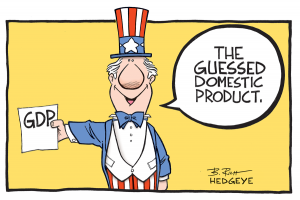GDP, we hear about it all the time, and whatever it is makes nations cry when it (technically, real GDP growth) decreases and celebrate when it chugs along at 3%. But what the heck is it really indicating? And is it even good at its job??
In short, GDP is a measure accumulating all of a nation’s production to indicate the nation’s wealth, and, also in short, it’s not that accurate or helpful.
See GDP was developed during the great depression to help take stock of what was actually going on in the American economy – so that people could stop flailing around blindly and figure out what to target and how.
When the product of labor is a physical object we call it a good, and when the product of labor is an activity (like accounting, IT support, or yardwork) it’s called a service. Back then, most production was of goods, coming from big material industries like steel, cars, coal, etc. So those making the GDP measure made sure to account for many of the production nuances in making goods.
But services, which made up only a small portion of the American economy back then, weren’t (and thus aren’t) incorporated well into GDP. Right now, we’re definitely undervaluing really important services like healthcare and education because of this lack of inclusion, and frankly because they’re not as easy to put a dollar value on.

More importantly, in condensing all production into a single variable, we lose meaningful information like what was produced and where wealth is accumulating. You can learn that a country is getting wealthier but you can’t learn that there’s rising inequality from GDP.
Likewise, you can’t learn that the country is getting rich at the expense of it’s natural resources from GDP. Also, a $10 million rise in services feeding the poor is treated exactly the same as a $10 million rise in production of grenades. That is to say, GDP says nothing about the moral value of one good/service over another.
GDP also never says when to quit. In a world with finite resources, we won’t be able to expand GDP indefinitely, and the American lifestyle is already far past sustainability.
GDP is most similar to a speedometer, which tells you how fast you’re going but says nothing to the safety of that speed or how much gas is left in the tank. We need more “dashboard indicators” (they’re actually called that) to paint a better picture of where the American economy is and should morally be going.
Most of this argument is taken from “Mismeasuring Our Lives: Why GDP doesn’t Add Up” by Joseph E. Stiglitz, it’s a short book looking at what’s wrong with and how to fix GDP. If you take Economics of Happiness you’ll read and hopefully enjoy it, I know I did!
